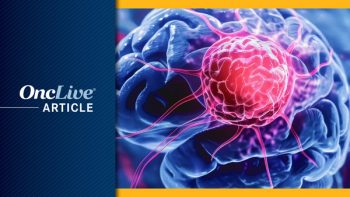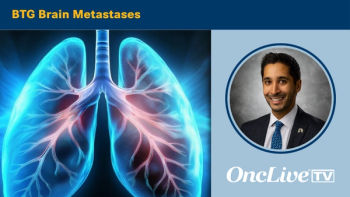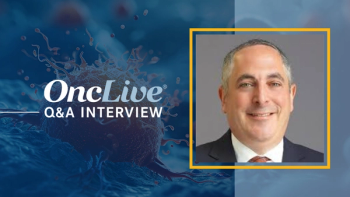
Nivolumab Safe, Effective in Early Stage Glioblastoma Study
Single-agent nivolumab demonstrated encouraging signs of activity with a mild adverse event profile for patients with recurrent glioblastoma multiforme.
David Reardon, MD
Single-agent nivolumab (Opdivo) demonstrated encouraging signs of activity with a mild adverse event (AE) profile for patients with recurrent glioblastoma multiforme (GBM), according to findings from the open-label CheckMate-143 trial presented at the 2016 ASCO Annual Meeting.
In the multi-cohort study, which also explored the combination of nivolumab and ipilimumab, the 12-month overall survival (OS) rate was 40% with nivolumab monotherapy (95% CI, 12.3-67.0). Median OS was 10.5 months (95% CI, 4.1-not evaluated) and there were no grade 3/4 adverse events (AEs).
Based on these findings, a phase III cohort has been opened within CheckMate-143 that will compare single-agent nivolumab with bevacizumab (Avastin) for patients with recurrent GBM. This cohort of the study could serve as a registration study for the PD-1 inhibitor in GBM, according to lead investigator David A. Reardon, MD.
"These data, although preliminary, are highly encouraging," said Reardon, clinical director, Center for Neuro-Oncology, Dana-Farber Cancer Institute. “This is a very complex study with many arms, including a registration phase III of nivolumab versus bevacizumab. At ASCO 2016 we are reporting on the 2 ipilimumab plus nivolumab arms and nivolumab monotherapy from the original phase II part of the study.”
At the time of the analysis, the study had enrolled patients with recurrent or progressive GBM across 2 study cohorts looking at nivolumab alone or in combination with ipilimumab, both at various doses and schedules. Treatment was continued until disease progression or unacceptable toxicity.
In cohort 1 of the study, 20 patients were randomized to receive nivolumab at 3 mg/kg every 2 weeks (Q2W) or nivolumab at 1 mg/kg plus ipilimumab at 3 mg/kg every 3 weeks (Q3W; N1/I3). In cohort 1b, 20 patients received nivolumab at 3 mg/kg plus 1 mg/kg of ipilimumab Q3W (N3/I1). After 4 doses, those in the combination arms went on to receive single-agent nivolumab at 3 mg/kg Q2W.
All patients had grade IV glioma and were in their first recurrence following radiation and temozolomide. Ages ranged from a median of 57 years in cohort 1 to 60 years in cohort 1b. The median Karnofsky performance status was 90 (range, 70-90). MGMT was unmethylated for half of the study participants in each cohort. PD-L1 status was determined using immunohistochemistry, with 60% and 77% of evaluable patients testing positive on ≥1% of cells in cohort 1 and 1b, respectively.
There was 1 partial response by RANO criteria in the single-agent nivolumab arm, and 50% of patients had stable disease. In the N1/I3 and N3/I1 groups, 40% and 50% of patients had stable disease, respectively; however, responses were not recorded.
In the N1/I3 arm, the median OS was 9.3 months (95% CI, 4.0-12.7) and the 12-month OS rate was 30% (95% CI, 7.1-57.8). In the N3/I1 arm, the median OS was 7.3 months (95% CI, 4.8-13.0) and the 12-month OS rate was 35% (95% CI, 15.7-55.2).
In the single-agent nivolumab arm, the median progression-free survival (PFS) was 1.9 months (95% CI, 1.3-6.5). The median PFS was 2.1 months with N1/I3 (95% CI, 0.5-3.0) and 2.4 months with N3/I1 (95% CI, 1.4-4.7).
"The efficacy results are very limited due to very small sample size. In fairness it is not appropriate to draw firm conclusions due to this," Reardon noted. "That being said, there is concern that the toxicity of the original ipilimumab/nivolumab dosing may contribute to lower efficacy with time. The revised dosing schedule is better tolerated and likely to have better efficacy due to enhanced compliance."
Grade 1/2 treatment-related AEs occurred in 90% of patients treated with single-agent nivolumab. There were no grade 3-5 events in the monotherapy arm. Serious treatment-related AEs occurred in 20% of patients in the single agent arm.
All patients treated with the nivolumab/ipilimumab combination experienced treatment-related AEs. Grade 3/4 treatment-related AEs occurred in 90% of patients treated in the N1/I3 arm and in 25% of those treated with N3/I1 dose. Serious treatment-related AEs were seen in 70% and 10% of those treated with the N1/I3 and N3/I1 arms, respectively.
In cohort 1, none of the patients in the single-agent nivolumab arm discontinued due to toxicity. In the combination arm, 3 patients stopped the drug following AEs. In cohort 1b, just 1 patient stopped the combination from AEs.
The median treatment durations were 2.3, 2.2, and 2.5 months, with single-agent nivolumab, N1/I3, and N3/I1, respectively. The median ipilimumab treatment duration was nearly doubled with the lower 1 mg/kg dose of ipilimumab versus the 3 mg/kg dose (2.1 vs 1.2 months).
"The results we are reporting show that the combination with lower dose ipilimumab plus standard nivolumab is well tolerated," said Reardon. "Modification of ipilimumab dosing appears to significantly improve tolerability when administered with anti-PD-1 therapy. Further follow-up and additional testing of the combination appear warranted for glioblastoma patients."
The phase III cohort of the CheckMate-143 study, known as cohort 2, is utilizing the same dosing for single-agent nivolumab as was administered in cohort 1. In this randomized portion of the study, bevacizumab will be administered at 10 mg/kg every 2 weeks. The phase III study cohort has a primary endpoint of OS and plans to enroll 440 total participants. The estimated primary completion date for the study is April 2017 (NCT02017717).
Reardon DA, Sampson JH, Sahebjam S, et al. Safety and activity of nivolumab (nivo) monotherapy and nivo in combination with ipilimumab (ipi) in recurrent glioblastoma (GBM): Updated results from checkmate-143. J Clin Oncol. 2016;34 (suppl; abstr 2014).
<<<


































